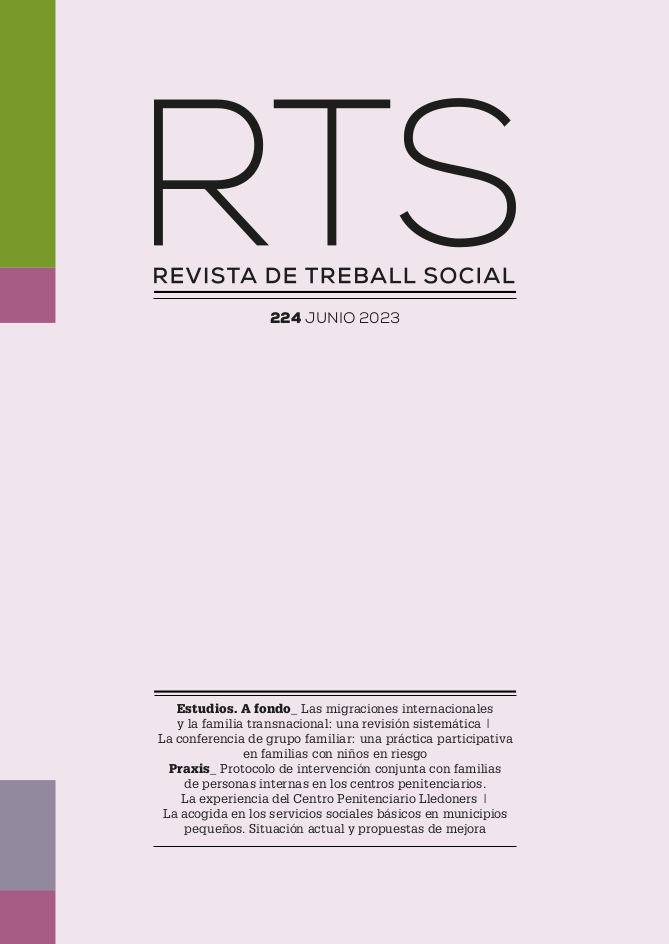This paper seeks to show and promote, among the professional prison community, the experience of creating and applying a procedure that we refer to as the Protocol for Joint Intervention involving Families (or PICFA from the Catalan, for short) at Lledoners prison. This working protocol encourages relatives of inmates inside the prison to become involved and to gain access to interventions so that joint meetings can be organised among inmates and with professionals from the multidisciplinary teams (abbreviated herein with EMD). The general goal of these interventions is to address specific issues relating to treatment and to the rehabilitation and reintegration processes that unfold in prisons. Consequently, based on the experience built up from the practice that began in 2016, in 2019 the authors performed the task of conceptualising and researching the theoretical framework behind this kind of intervention, generating a more suitable and well-founded operating framework. The value that this experience provides is that it takes place within a setting that is closed off to the community (a prison) and which often cannot be permeated by external agents, including relatives and/or other relevant actors from the social settings of inmates. At the same time, it facilitates communication between the various agents that are closely involved with the inmate, led by social work professionals as part of a multidisciplinary initiative.
Article
Protocol for joint intervention involving families of inmates at prisons. The experience of Lledoners prison
Caballero, Alberto, and Pujol, Núria. (2022). Propuesta para la participación de las familias de internos de Centros Penitenciarios en Cataluña. Poniendo en valor el rol de las familias. Revista de Treball Social, 222, 93-113. doi.org/10.32061/RTS2022.222.05
Consejo de Europa, Comité de Ministros. (2016). Regles penitenciàries i Codi ètic europeu per al personal penitenciari (Consell d’Europa). CEJFE. Retrieved on 6 April 2023, from https://cejfe.gencat.cat/web/.content/home/publicacions/colleccio_docs/docs2_regles_penitenciaries_codi_europeu.pdf
Delgado, Luis Esteban. (2004). El art. 25.2 CE: algunas consideraciones interpretativas sobre la reeducación y la reinserción social como fin de las penas privativas de libertad. Revista jurídica de Castilla y León, 1 (extra), 339-370. Dialnet. https://dialnet.unirioja.es/servlet/articulo?codigo=835214
Enjuanes, Jordi. (2020). Hacia la construcción de las bases de un modelo de ejecución penal en base al concepto de ciudadanía activa. Estudio de tres casos en el sistema de ejecución penal español y catalán. (Tesis doctoral, Universidad Ramon Llull). https://www.tesisenred.net/handle/10803/668815
Escribano, Xavi, and Palasí, Eva. (2018). Treball social comunitari com a base de reinserció en els centres penitenciaris. Pedagogia i Treball social, 7(2), 50-69. RACO. https://raco.cat/index.php/PiTS/article/view/362296/456814
Fernández, Josefina (Coord.). (2015). Document de bases per a la intervenció amb les famílies des del treball social. GRITS, Universidad de Barcelona. Retrieved on 8 May 2023, from http://www.ub.edu/grits/wp-content/uploads/DOCUMENT-DE-BASES-Imprimible.pdf
Fernández, Tomás, and Ponce de León, Laura. (2011). Trabajo social con familias. Alianza Editorial.
Ibàñez, Aina, and Pedrosa, Albert. (2018). El paper de les famílies en la reinserció de les persones que surten de presó. CEJFE. Retrieved on 6 April 2023, from https://ddd.uab.cat/pub/worpap/2018/191957/paperFamiliesReinsercio_CA.pdf
Instrucción 4/2005 relativa a determinadas condiciones para el acceso a permisos de salida y a salidas programadas de internos en régimen ordinario. Departamento de Justicia. Retrieved on 6 April 2023, from https://justicia.gencat.cat/web/.content/documents/instruccions_i_circulars/i4_2005_condicions_permisos.pdf
Ley Orgánica 1/1979, de 26 de septiembre, general penitenciaria. BOE núm. 239 § 23708 (1979).
Martí, Joel, and Cid, José. (2015). Encarcelamiento, lazos familiares y reincidencia. Explorando los límites del familismo. Revista internacional de sociología, 73(1). doi.org/10.3989/ris.2013.02.04
McNeill, Fergus. (2017). Las consecuencias colaterales del riesgo. InDret, 1. RACO. https://raco.cat/index.php/InDret/article/view/318377/408511
Morata, Txus, and Enjuanes, Jordi. (2018). Repensant la intervenció penitenciària des de l’acció comunitària i l’educació ciutadana. Pedagogia i Treball social, 7(2), 3-24. DUGIDocs. https://dugi-doc.udg.edu/bitstream/handle/10256/17584/1Article.pdf?sequence=1&isAllowed=y
Real Decreto 190/1996, de 9 de febrero, por el que se aprueba el Reglamento penitenciario. BOE núm. 40 § 3307 (1996).
Roigé, Xavier (Coord.). (2006). Familias de ayer, familias de hoy: continuidades y cambios en Cataluña. Icaria.
Savolainen, Jukka. (2009). Work, family and criminal desistance. Adult social bonds in a nordic welfare state. The British Journal of Criminology, 49(3), 285-304. doi.org/10.1093/bjc/azn084
Viscarret, Juan Jesús. (2014). Modelos y métodos de intervención en Trabajo Social. Alianza Editorial.
Wills, Thomas A., and Shinar, Ori. (2000). Measuring perceived and received social suport. En Sheldon Cohen, Lynn G. Underwood, y Benjamin H. Gottlieb (Eds.), Social support measurement and intervention: A guide for health and social scientists (p. 86-135). Oxford University Press. doi.org/10.1093/med:psych/9780195126709.003.0004





